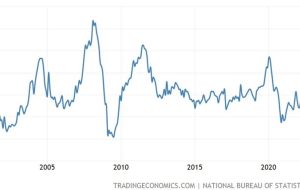Weekly Market Recap (10-14 July)
[ad_1] Monday: China CPI missed expectations coming at 0.0% vs. 0.2% expected for the Y/Y reading and -0.2% vs. 0.0% expected for the M/M figure. Moreover, the PPI Y/Y came at -5.0% vs. -4.6% expected. These figures signal that China is sliding into deflation, and we should see stronger easing measures being adopted soon. China

[ad_1]
Monday:
China CPI missed
expectations coming at 0.0% vs. 0.2% expected for the Y/Y reading and -0.2% vs.
0.0% expected for the M/M figure. Moreover, the PPI Y/Y came at -5.0% vs. -4.6%
expected. These figures signal that China is sliding into deflation, and we should
see stronger easing measures being adopted soon.
China CPI YoY
Fed’s Barr (hawk –
voter) said that inflation is far too high and that they are attentive to bring
inflation down to target. He acknowledged that they made a lot of progress on
inflation and that they are close (to the end of the hiking cycle) but they
still have a bit of work to do.
The NY Fed 1-year
ahead inflation expectations eased to 3.8% vs. 4.1% previously, which is the
lowest since April 2021. The bad news is that the 3-year ahead expected
inflation remained unchanged at 3% and the 5-year expected inflation jumped to
3% vs. 2.7% previously.
New York Federal Reserve
Fed’ Mester (hawk
– non voter) said that the Fed will need to tighten somewhat further to lower
inflation as its policy is less restrictive compared to history. She continued
saying that raising rates again will reduce the risk of more action in the
future. She acknowledged that the rate hikes have been moderating the economic
activity, but the economy proved stronger than expected. She also said that the
Fed is closed to the end of its tightening campaign. She added that the gains
in core inflation are too high and broad-based, and wages pressures remain too
high to get inflation back to 2% target. She concluded that there’s no decision
yet on the need for a July rate hike as more data is needed.
Fed’s Daly (hawk –
non voter) said that the US economic momentum continues to surprise and
therefore there’s more that they need to do with rate hikes. She added that
they are data dependent but sees the need for two more rate hikes this year to
lower high inflation amidst a robust labour market. She acknowledged that the
precise number of rate hikes may be adjusted based on the economic data and
more or fewer hikes may be needed. She concluded that the Fed should increase
rates more slowly than last year to evaluate the economy’s response but thinks
that the risk of underacting continues to outweigh the risk of overacting
despite these risks being more balanced now.
BoE’s Bailey
(hawk) said that UK inflation is unacceptably high, but it’s expected to
decrease significantly. He acknowledged that both price and wage increases at
current rate are inconsistent with the inflation target. He added that the MPC
is monitoring developments in the labour market, wage growth and services price
inflation.
Fed’s Bostic (dove
– non voter) said that inflation is too high and not sustainable and that a lot
of the strength is due to pandemic support. He added that the trajectory on
inflation right now is in the right direction and the Fed will ensure that it
continues. A recession is not his baseline outlook, but the biggest risk is not
moving inflation back to target. He continued with saying that the policy is
clearly in restrictive territory right now and the Fed can be patient as the
economy is starting to slow down with job growth slowing and inflation coming
down. He concluded that there is no expectation of needing to raise rates any
further from here and that even with a 25 bps move at the next meeting, it will
still require patience.
Tuesday:
The UK payrolls
missed expectations coming at 102K vs. 125K expected and 250K prior. The
unemployment rate has also increased to 4.0% vs. 3.8% expected and the 3.8%
prior. The worst part of the report for the BoE were the wages data that
surprised again to the upside. In fact, the average weekly earnings came at
6.9% vs. 6.8% expected and 6.5% prior (revised to 6.7%). The average weekly
earnings ex-bonus printed at 7.3% vs. 7.1% expected and 7.2% prior (revised to
7.3%). The market started to price in a higher chance of a 50 bps hike from the
BoE after the release.
UK Average Weekly Earnings ex Bonus
ECB’s Villeroy (hawk)
said that they are close to the peak in interest rates and once they hit the
peak, they will need to stay at that level for a while. He acknowledged that
they are starting to see good news on inflation, and it’s expected that it will
continue to decline and be back to 2% by 2025.
The US Redbook Y/Y
got some attention as the index fell -0.4% vs. 0.7% last week and this was the
first negative reading since the start of the pandemic.
US Redbook YoY
Wednesday:
The RBNZ left its
cash rate unchanged at 5.50% as widely expected. Below the key passages from
the statement:
- The
level of interest rates are constraining spending and inflation pressure as
anticipated and required. - The
Committee agreed that the OCR will need to remain at a restrictive level for
the foreseeable future, to ensure that consumer price inflation returns to the
1 to 3% annual target range, while supporting maximum sustainable employment. - Global
economic growth remains weak and inflation pressures are easing. - Global
inflation rates continue to decline, assisted by the normalisation of
international supply chains, and the decline in shipping costs and energy
prices. - The
weaker global growth has led to lower export prices for New Zealand’s goods. - In
New Zealand, inflation is expected to continue to decline from its peak, and
with it measures of inflation expectations. Core inflation is expected to
decline as capacity constraints ease. - While
employment is above its maximum sustainable level, there are signs of labour
market pressures dissipating and vacancies declining. - The
Committee is confident that with interest rates remaining at a restrictive
level for some time, consumer price inflation will return to within its target
range of 1 to 3% per annum, while supporting maximum sustainable employment.
Reserve Bank of New Zealand
RBA’s Governor
Lowe said that it’s possible there will be more rate hikes still to come to
return inflation back to target. He acknowledged that it remains to be
determined whether monetary policy has more work to do as the picture on
inflation is complex and there are significant uncertainties regarding outlook.
He added that he’s very conscious that monetary policy operates with lag and
the full effects are yet to be felt. He concluded that he’s “deadly serious”
about getting inflation back to target and that he’s confident that higher
interest rates are working.
The US CPI missed
expectations across the board with the Y/Y figure coming at 3.0% (2.97%
unrounded) vs. 3.1% expected and 4.0% prior. The M/M reading printed at 0.2%
vs. 0.3% expected and 0.1% prior. The even better news is that Core Inflation
figures have also missed expectations with the Y/Y rate coming at 4.8% vs. 5.0%
expected and 5.3% prior, and the M/M figure printing at 0.2% (0.158% unrounded)
vs. 0.3% expected and 0.4% prior.
US Core CPI MoM
Fed’s Barkin (hawk
– non voter) was the first one to speak after the CPI release and he didn’t
hint to any skip or pause at the July meeting, instead he said that inflation
remains too high and there’s still a question whether inflation can settle
while labour market remains as strong as it is. He concluded that he’s
comfortable doing more with policy if incoming data does not confirm that
inflation will return to target.
Fed’s Kashkari
(hawk – voter) said that if high inflation persists, they may need to raise rates
further. He added that the fight against inflation must succeed but
acknowledged that higher rates could increase pressure on banks and that’s why
bank supervisors should ensure that all banks are prepared to withstand higher
rate environment.
Given the
tightness in the labour market and the lack of hints to a possible skip or
pause from the Fed members, the market still expects the FOMC to hike by 25 bps
at the July meeting. Notably, the “Fed whisperer” Nick Timiraos has also
published an article after the CPI release stating that this report is unlikely
to change the Fed’s course on a 25 bps hike at the upcoming meeting. Nevertheless,
the chances of rate increases after the July meeting plunged.
CME FedWatch Tool
ECB’s Vujcic (hawk
– voter) said that the September ECB meeting is very open. He acknowledged that
China is a risk to GDP outlook and that slowing down the pace of rate hikes is
certainly a possibility. He concluded that even if they pause, they will still
say that they can resume hiking.
ECB’s Lane (dove –
voter) said that the typical length and monetary transmission mean that full
economic impact of the tightening over the last year will only play out over
the next couple of years.
The BoC raised
interest rates by 25 bps to 5.0% as expected. The key lines from the statement
below:
- Robust
demand and tight labour markets are causing persistent inflationary pressures
in services. - Canada’s
economy has been stronger than expected, with more momentum in demand. - While
the Bank expects consumer spending to slow in response to the cumulative
increase in interest rates, recent retail trade and other data suggest more
persistent excess demand in the economy. - The
housing market has seen some pickup. New construction and real estate listings
are lagging demand, which is adding pressure to prices. - In
the labour market, there are signs of more availability of workers, but
conditions remain tight, and wage growth has been around 4-5%. Strong
population growth from immigration is adding both demand and supply to the
economy: newcomers are helping to ease the shortage of workers while also
boosting consumer spending and adding to demand for housing. - As
higher interest rates continue to work their way through the economy, the Bank
expects economic growth to slow. - While
CPI inflation has come down largely as expected so far this year, the downward
momentum has come more from lower energy prices, and less from easing
underlying inflation. With the large price increases of last year out of the
annual data, there will be less near-term downward momentum in CPI inflation. - Moreover,
with three-month rates of core inflation running around 3½-4% since last
September, underlying price pressures appear to be more persistent than
anticipated. This is reinforced by the Bank’s business surveys, which find
businesses are still increasing their prices more frequently than normal. - Governing
Council remains concerned that progress towards the 2% target could stall,
jeopardizing the return to price stability. - Governing
Council will continue to assess the dynamics of core inflation and the outlook
for CPI inflation. In particular, we will be evaluating whether the evolution
of excess demand, inflation expectations, wage growth and corporate pricing
behaviour are consistent with achieving the 2% inflation target.
BoC’s Governor
Macklem said that they are concerned that if they are not careful, the progress
to price stability could stall and if they get some upward surprises, inflation
could even move back higher. He added that there was not a big benefit of
waiting to raise rates, but they did discuss the possibility of keeping rates
unchanged. The monetary policy is working but underlying inflationary pressures
are proving more stubborn while the labour market remains tight, even if there
are some signs of easing. He said that the Bank of Canada is prepared to raise
rates further as if they don’t do enough now, they will likely have to do even
more later.
Bank of Canada
Thursday:
The New Zealand
Manufacturing PMI for June came at 47.5 vs. 48.9 previously. For a weaker
reading one has to go back to August 2021 (39.0) when the Delta strain outbreak
of COVID-19 invoked level-4 lockdowns.
New Zealand Manufacturing PMI
The UK May monthly
GDP came at -0.1% vs. -0.3% expected and 0.2% prior.
ECB’s Visco (dove
– non voter) said that they are not very far from the peak in interest rates
and that he somewhat disagrees with the preference for further tightening.
The ECB released
the accounts of its June monetary policy meeting. Below the key lines:
· Members considered that there were both
upside and downside risks to the inflation outlook.
· It was argued that market participants would
be surprised by the upward revision of inflation.
· This could trigger a repricing of the forward
curve.
· Members broadly concurred that inflation was
still projected to remain too high for too long.
· It was argued that policymakers should not
put too much emphasis on the behaviour of core inflation, as its mandate
related to headline inflation.
· Maintaining a gradual tightening path would
allow the ECB to monitor and assess the impact of past monetary policy
decisions and ensure that financial conditions were adjusting in a way that was
consistent with inflation moving back to the 2% medium-term target.
· Members generally agreed that the
data-dependent approach to monetary policymaking.
·
Policymakers should stress that fiscal policy needed to be tightened in
order to dampen demand and support the disinflation process.
European Central Bank
The US PPI missed
expectations across the board with the Y/Y figure coming at 0.1% vs. 0.4%
expected and 1.1% prior, while the M/M reading printed at 0.1% vs. 0.2%
expected and -0.4% prior (revised from -0.3%). The Core PPI Y/Y figure came at
2.4% vs. 2.6% expected and 2.6% prior (revised from 2.8%), while the M/M
reading printed at 0.1% vs. 0.2% expected and 0.1% prior (revised from 0.2%).
US PPI YoY
The US Initial
Claims beat expectations coming at 237K vs. 250K expected and 249K prior. On
the other hand, Continuing Claims missed expectations coming at 1729K vs. 1723K
expected and 1718K prior.
US Initial Claims
Fed’s Daly (hawk –
non voter) said that the good news on inflation this week is indeed good news.
She acknowledged that saying that they needed 2 more rate hikes was a way to
keep optionality open but it’s too early to say that we can declare victory on inflation.
She continued saying that the lags in monetary policy are generally between 12
and 24 months and that there are still cumulative effects of monetary
tightening that will work its way through the system. She added that they are
going to continue to work on rate hikes until they are sure that inflation is
on the path to come back down toward the 2% target. She acknowledged that if
they wait for inflation to be 2% and have monetary lags, it’s better to head to
a less restrictive policy to adjust for the last. In fact, as inflation starts
coming down, they can start lowering the nominal rate to bring real rates down
to neutral levels. She concluded that they are not there yet and the skip at
the June meeting was because as they reach their destination, they want to slow
the pace of hikes.
Friday:
Fed’s Waller (hawk
– voter) said that he’s in favour of raising interest rates at the July FOMC
meeting as he’s increasingly confident that the banking stress won’t derail the
economy and that the cooler CPI data is welcome, but they need to see if it’s
sustained given that inflation has shown false dawns before. He added that although
the job market has slowed, it remains very strong and that coupled with the
economic strength gives the Fed space to hike further. He still thinks that the
Fed will likely need two more 25 bps hikes this year as the monetary policy
changes are moving through the economy more quickly and the bulk of past rates
hikes have already impacted the economy. He concluded that fighting inflation
remains the Fed’s main goal and that they will succeed.
The Japanese media
reported that the BoJ is likely to raise its FY2023 inflation forecast above
2%. They previously expected inflation falling down from September/October, but
now they are not confident on such a scenario anymore. This might be another
signal that a change in policy like a tweak to the YCC might be coming. Another
possible hint came from the former BoJ director Hayakawa as he said that he
expects the BoJ to tweak YCC at the July meeting (27-28th July)
widening the target band to -/+ 1.00% from the current -/+ 0.50%.
Bank of Japan
Fed’s Goolsbee
(dove – voter) said that there’s a way to curb inflation without a recession
and that weaker inflation data shows that the Fed is making progress.
The University of Michigan Consumer Sentiment for July jumped to 72.6 vs. 65.5 expected and 64.4 prior. The Current Conditions index printed at 77.5 vs. 70.4 expected and 69.0 prior, while the Expectations index came at 69.4 vs. 61.8 expected and 61.5 prior. The 1-year inflation expectations ticked higher to 3.4% vs. 3.3% prior and the 5-year inflation expectations printed at 3.1% vs. 3.0% prior.That’s a really strong release.
University of Michigan Consumer Sentiment
The highlights for
next week include:
- Tuesday: US Retail Sales, Canada CPI.
- Wednesday: NZ CPI, UK CPI.
- Thursday: PBoC LPR, Australia Jobs Report, US Jobless Claims.
- Friday: Japan CPI.
That’s all folks,
have a great weekend!
.
[ad_2]
لینک منبع : هوشمند نیوز
 آموزش مجازی مدیریت عالی حرفه ای کسب و کار Post DBA آموزش مجازی مدیریت عالی حرفه ای کسب و کار Post DBA+ مدرک معتبر قابل ترجمه رسمی با مهر دادگستری و وزارت امور خارجه |  آموزش مجازی مدیریت عالی و حرفه ای کسب و کار DBA آموزش مجازی مدیریت عالی و حرفه ای کسب و کار DBA+ مدرک معتبر قابل ترجمه رسمی با مهر دادگستری و وزارت امور خارجه |  آموزش مجازی مدیریت کسب و کار MBA آموزش مجازی مدیریت کسب و کار MBA+ مدرک معتبر قابل ترجمه رسمی با مهر دادگستری و وزارت امور خارجه |
 مدیریت حرفه ای کافی شاپ |  حقوقدان خبره |  سرآشپز حرفه ای |
 آموزش مجازی تعمیرات موبایل آموزش مجازی تعمیرات موبایل |  آموزش مجازی ICDL مهارت های رایانه کار درجه یک و دو |  آموزش مجازی کارشناس معاملات املاک_ مشاور املاک آموزش مجازی کارشناس معاملات املاک_ مشاور املاک |
برچسب ها :July ، Market ، Recap ، Weekly ، Weekly Market Recap
- نظرات ارسال شده توسط شما، پس از تایید توسط مدیران سایت منتشر خواهد شد.
- نظراتی که حاوی تهمت یا افترا باشد منتشر نخواهد شد.
- نظراتی که به غیر از زبان فارسی یا غیر مرتبط با خبر باشد منتشر نخواهد شد.





ارسال نظر شما
مجموع نظرات : 0 در انتظار بررسی : 0 انتشار یافته : ۰